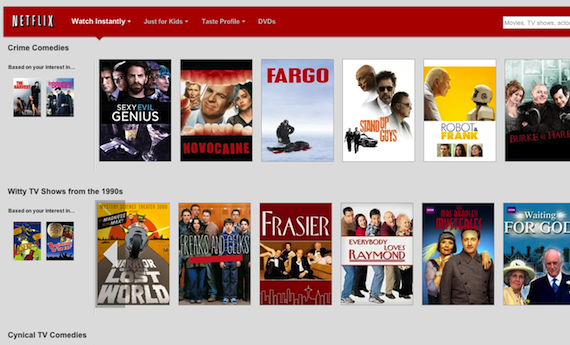Is Netflix A Loser Or Winner With End Of Net Neutrality?
 Yesterday’s ruling by a federal appeals court gives Internet service providers the ability to charge premium rates or additional fees to whichever content providers the ISPs want. Considering that Netflix is the single largest user of bandwidth in the U.S., many observers predict this ruling is bad news for the streaming video service, but some contend that Netflix may come out a winner in the long run.
Yesterday’s ruling by a federal appeals court gives Internet service providers the ability to charge premium rates or additional fees to whichever content providers the ISPs want. Considering that Netflix is the single largest user of bandwidth in the U.S., many observers predict this ruling is bad news for the streaming video service, but some contend that Netflix may come out a winner in the long run.
The negatives for Netflix are obvious. ISPs like Verizon, which has already been accused of deliberately allowing Netflix traffic to become bottlenecked, that have competing streaming video services (Redbox Instant is a joint venture of Redbox and Verizon) can throttle Netflix data so that consumers get an unsatisfying experience, effectively taking away any value to the Netflix subscriber. At the same time, Verizon could give priority access to Redbox Instant.
Of course the ISPs will likely not just tell Netflix to go suck eggs and deal with the throttled data speeds; not when there is money to be made. Netflix will undoubtedly be offered the opportunity to pay for unfettered access to ISPs’ networks. And, barring any sort of legislative or regulatory intervention, Netflix will have to ante up if it wants to keep its position as the market leader in streaming video.
Surprisingly, it’s this very pay-to-play proposition that GigaOm’s Stacey Higginbotham argues that Netflix may actually be a winner. Higginbotham contends that Netflix, and other bandwidth gobblers like Skype, have the deep pockets required to pay for priority access without going under.
Indeed, if Netflix does have the money to pay the inevitable fees from the various ISPs, it could outlast a number of smaller competitors who can’t pay the higher toll for access to the old information superhighway. Paying the ISPs’ ransom would also mean — hopefully — a higher quality of video being delivered to Netflix subscribers.
But at what cost?
I’d contend that Netflix may not have the deep pockets some believe it does. The company has recently seen an improvement in its profit margin, but Netflix is known for investing much of its money in content — TV studios get so much money from Netflix they refer to the revenue as “pure heroin” — and in streaming technology to deliver uninterrupted feeds to subscribers’ homes — all at what most people feel is a reasonable monthly rate.
Regardless, it’s not like Reed Hastings is swimming in some Scrooge McDuck-like pool of gold coins that is just waiting to be handed over to ISPs. The money for these fees — which Bloomberg figures could be as much as 10% of Netflix’s annual revenue — will have to come from somewhere.
Maybe that means a smaller investment in content, meaning fewer TV shows and movies in the Netflix library. Maybe it means higher rates being charged to the customer, meaning the cost of the access fees is just being shifted to the end user (just like cable TV).
Regardless of whether Netflix wins or loses in the long run, the ultimate loser is the consumer.
Want more consumer news? Visit our parent organization, Consumer Reports, for the latest on scams, recalls, and other consumer issues.

